Related Research Articles
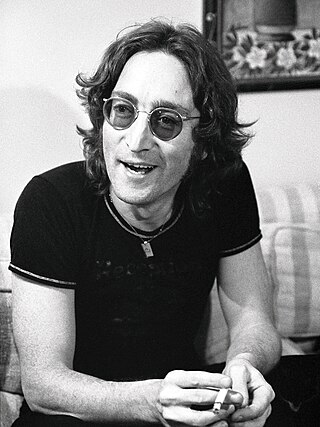
John Winston Ono Lennon was an English singer, songwriter and musician. He gained worldwide fame as the founder, co-lead vocalist and rhythm guitarist of the Beatles. His work included music, writing, drawings and film. His songwriting partnership with Paul McCartney remains the most successful in history as the primary songwriters in the Beatles.

Julian Charles John Lennon is an English musician, photographer, author, and philanthropist. He is the son of Beatles member John Lennon and his first wife, Cynthia, and he is named after his paternal grandmother, Julia Lennon. Julian inspired three Beatles songs: "Lucy in the Sky with Diamonds" (1967), "Hey Jude" (1968), and "Good Night" (1968). His parents divorced in 1968 after his father had an affair with Yoko Ono.

Help! is the fifth studio album by the English rock band the Beatles and the soundtrack to their film of the same name. It was released on 6 August 1965 by Parlophone. Seven of the fourteen songs, including the singles "Help!" and "Ticket to Ride", appeared in the film and take up the first side of the vinyl album. The second side includes "Yesterday", the most-covered song ever written. The album was met with favourable critical reviews and topped the Australian, German, British and American charts.

John Lennon/Plastic Ono Band is the debut solo studio album by English musician John Lennon. Backed by the Plastic Ono Band, it was released by Apple Records on 11 December 1970 in tandem with the similarly titled album by his wife, Yoko Ono. At the time of its issue, John Lennon/Plastic Ono Band received mixed reviews overall, but later came to be widely regarded as Lennon's best solo album.

"Lucy in the Sky with Diamonds" is a song by the English rock band the Beatles from their 1967 album Sgt. Pepper's Lonely Hearts Club Band. It was written primarily by John Lennon with assistance from Paul McCartney, and credited to the Lennon–McCartney songwriting partnership. Lennon's son Julian inspired the song with a nursery school drawing that he called "Lucy – in the sky with diamonds". Shortly before the album's release, speculation arose that the first letter of each of the nouns in the title intentionally spelled "LSD", the initialism commonly used for the hallucinogenic drug lysergic acid diethylamide. Lennon repeatedly denied that he had intended it as a drug song, and attributed the song's fantastical imagery to his reading of Lewis Carroll's Alice in Wonderland books.
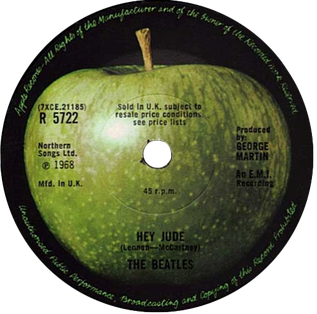
"Hey Jude" is a song by the English rock band the Beatles that was released as a non-album single in August 1968. It was written by Paul McCartney and credited to the Lennon–McCartney partnership. The single was the Beatles' first release on their Apple record label and one of the "First Four" singles by Apple's roster of artists, marking the label's public launch. "Hey Jude" was a number-one hit in many countries around the world and became the year's top-selling single in the UK, the US, Australia and Canada. Its nine-week run at number one on the Billboard Hot 100 tied the all-time record in 1968 for the longest run at the top of the US charts, a record it held for nine years. It has sold approximately eight million copies and is frequently included on music critics' lists of the greatest songs of all time.
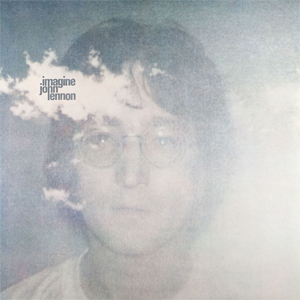
Imagine is the second solo studio album by English musician John Lennon, released on 9 September 1971 by Apple Records. Co-produced by Lennon, his wife Yoko Ono and Phil Spector, the album's elaborate sound contrasts the basic, small-group arrangements of his first album, John Lennon/Plastic Ono Band (1970), while the opening title track is widely considered to be his signature song.

Mind Games is the fourth solo studio album by English musician John Lennon. It was recorded at Record Plant Studios in New York in summer 1973. The album was released in the US on 29 October 1973 and in the UK on 16 November 1973. It was Lennon's first self-produced recording without help from Phil Spector. Like his previous album, the politically topical and somewhat abrasive Some Time in New York City, Mind Games received mixed reviews upon release. It reached number 13 in the UK and number 9 in the US, where it was certified gold in both territories.

Rock 'n' Roll is the sixth solo studio album by English musician John Lennon. Released in February 1975, it is an album of late 1950s and early 1960s songs as covered by Lennon. Recording the album was problematic and spanned an entire year: Phil Spector produced sessions in October 1973 at A&M Studios, and Lennon produced sessions in October 1974 at the Record Plant (East). Lennon was being sued by Morris Levy over copyright infringement of one line in his Beatles song "Come Together". As part of an agreement, Lennon had to include three Levy-owned songs on Rock 'n' Roll. Spector disappeared with the session recordings and was subsequently involved in a motor accident, leaving the album's tracks unrecoverable until the beginning of the Walls and Bridges sessions. With Walls and Bridges coming out first, featuring one Levy-owned song, Levy sued Lennon expecting to see Lennon's Rock 'n' Roll album.
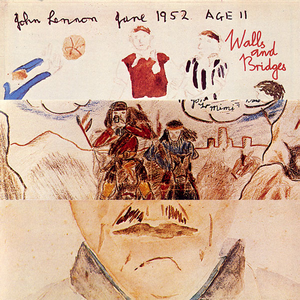
Walls and Bridges is the fifth solo studio album by English musician John Lennon. It was issued by Apple Records on 26 September 1974 in the United States and on 4 October in the United Kingdom. Written, recorded and released during his 18-month separation from Yoko Ono, the album captured Lennon in the midst of his "Lost Weekend". Walls and Bridges was an American number-one album on both the Billboard and Record World charts and included two hit singles, "Whatever Gets You thru the Night" and "#9 Dream". The first of these was Lennon's first number-one hit in the United States as a solo artist, and his only solo chart-topping single in either the US or Britain during his lifetime.

"Jealous Guy" is a song written and originally recorded by the English rock musician John Lennon from his second studio album Imagine (1971). Not released as a single during Lennon's lifetime, it became an international hit in a version by Roxy Music issued in early 1981; this version reached #1 in the UK and Australia, and was a top 10 hit in several European countries. Lennon's own version was subsequently issued as a single, and charted in the US and UK.

Abbey Road is the eleventh studio album by the English rock band the Beatles, released on 26 September 1969, by Apple Records. It is the last album the group recorded, although Let It Be (1970) was the last album completed before the band's break-up in April 1970. It was mostly recorded in April, July, and August 1969, and topped the record charts in both the United States and the United Kingdom. A double A-side single from the album, "Something" / "Come Together", was released in October, which also topped the charts in the US.
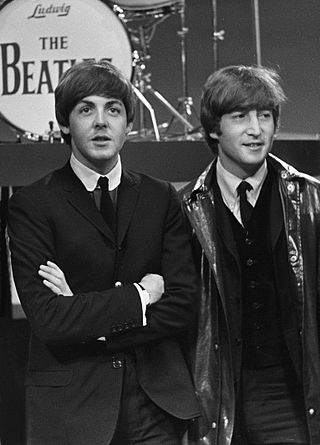
Lennon–McCartney was the songwriting partnership between English musicians John Lennon (1940–1980) and Paul McCartney of the Beatles. It is widely considered one of the greatest, best known and most successful musical collaborations ever by records sold, with the Beatles selling over 600 million records worldwide as of 2004. Between 5 October 1962 and 8 May 1970, the partnership published approximately 180 jointly credited songs, of which the vast majority were recorded by the Beatles, forming the bulk of their catalogue.

"Instant Karma!" is a song by English rock musician John Lennon, released as a single on Apple Records in February 1970. The lyrics focus on a concept in which the consequences of one's actions are immediate rather than borne out over a lifetime. The single was credited to "Lennon/Ono with the Plastic Ono Band", apart from in the US, where the credit was "John Ono Lennon". The song reached the top five in the British and American charts, competing with the Beatles' "Let It Be" in the US, where it became the first solo single by a member of the band to sell a million copies.

"Come Together" is a song by the British rock band the Beatles, written by John Lennon and credited to Lennon–McCartney. The song is the opening track on the band's 1969 album Abbey Road The "Something" single on which "Come Together" also appeared reached the top of the charts in the United States and Australia but peaked at No. 4 in the United Kingdom, both tracks being available on Abbey Road.
"Across the Universe" is a song by the English rock band the Beatles. It was written by John Lennon and credited to Lennon–McCartney. The song first appeared on the 1969 various artists' charity compilation album No One's Gonna Change Our World and later, in a different form, on their 1970 album Let It Be, the group's final released studio album. The original version featured on two different albums both titled Rarities: a 1978 British release and a 1980 US release. It was also included on their 1988 album Past Masters, Volume Two. The song has been covered by many artists, including David Bowie on his 1975 album Young Americans, which featured contributions from Lennon.

John Lennon was a British singer-songwriter and peace activist, best known as the co-founder of the Beatles. After three experimental albums with Yoko Ono, using tape loops, interviews, musique concrète, and other avant-garde performance techniques, Lennon's solo career properly began with the 1969 single "Give Peace a Chance". Lennon then released two more singles, "Cold Turkey" (1969) and "Instant Karma!" (1970), and a live album, Live Peace in Toronto (1969), before the official break-up of the Beatles.

"Cold Turkey" is a song written by English singer-songwriter John Lennon, released as a single in 1969 by the Plastic Ono Band on Apple Records, catalogue Apples 1001 in the United Kingdom, Apple 1813 in the United States. It is the second solo single issued by Lennon and it peaked at number 30 on the Billboard Hot 100 and number 14 on the UK Singles Chart. The song's first appearance on an album was Live Peace in Toronto 1969 where the song had been performed live on 13 September 1969 with Lennon reading the lyrics off a clip-board.

"Birthday" is a song by the English rock band the Beatles from their 1968 double album The Beatles. Written by John Lennon and Paul McCartney, mainly by McCartney, it is the opening track on the third side of the LP. Surviving Beatles Paul McCartney and Ringo Starr performed it for Starr's 70th birthday at Radio City Music Hall on 7 July 2010.

The John Lennon Signature Box is an 11-disc boxed set of remastered John Lennon albums and new collections, released on CD and digital format, as part of the "Gimme Some Truth" collection. The albums released in the boxed set are digital remasters of the original recordings and mixes, done by John's widow Yoko Ono and the same team of engineers at Abbey Road Studios who worked on the 2009 remasters by the Beatles, in London and Avatar Studios, New York. The set also includes home demos and non-album singles. The boxed set was released on vinyl in June 2015 by Universal Music Catalogue without the two additional discs.
References
- 1 2 "John Lennon: India, India". beatlesbible.com. 24 August 2010. Retrieved 27 July 2011.
- ↑ "Lennon's 'India, India' on Broadway". ApunKaChoice. Archived from the original on 2 May 2014. Retrieved 28 November 2011.
- ↑ "The Beatles -India (super rare John Lennon's demo)". Electric Bill Freedom. Archived from the original on 26 April 2012. Retrieved 28 November 2011.
- ↑ Johan van Slooten. "'Take me to your heart' – how John Lennon fell for India". Radio Netherlands Worldwide. Archived from the original on 26 September 2011. Retrieved 18 September 2011.